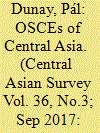|
|
|
Sort Order |
|
|
|
Items / Page
|
|
|
|
|
|
|
| Srl | Item |
| 1 |
ID:
153710


|
|
|
|
|
| Summary/Abstract |
Soon after the breakdown of the Soviet Union in 1991, a civil war started in Tajikistan (1992–97). This was also the period when a number of international organizations arrived in the country to distribute humanitarian assistance and assist in conflict resolution and stabilization. After the UN, the Organization for Security and Co-operation in Europe (OSCE) was the second key organization which appeared in the conflict-stricken country. Like other key international organizations in Tajikistan, the OSCE, which has been in the country since 1994, has seen a shift in its original functions of monitoring and emergency assistance. Some see its avowed objectives in the new century as formalistic, virtual and ineffective. By capturing perceptions of foreign assistance to Tajikistan among employees of the OSCE and other international organizations, NGO workers, government officials and ordinary citizens, this article explores how Tajikistan ‘socialized’ the OSCE, making the organization simultaneously a benefactor, an industry and even an intruder.
|
|
|
|
|
|
|
|
|
|
|
|
|
|
|
|
| 2 |
ID:
153712


|
|
|
|
|
| Summary/Abstract |
Since the late 1990s, the post-communist states of Central Asia, as ‘participating States’ of the Organization for Security and Cooperation in Europe, have been regularly persuaded by the organization to invite its Office for Democratic Institutions and Human Rights to monitor their national parliamentary and presidential elections. The OSCE/ODIHR’s objectives have been to assist the Central Asian participating states in holding free and fair elections and aid in a presumed ongoing post-communist democratization process. We argue that contrary to OSCE’s assumptions, repeated OSCE/ODIHR election observations of Central Asian states with histories of fraudulent elections (as demonstrated by the case study of Tajikistan during 2000–2013) have not contributed to the flourishing of democracy and political pluralism, but rather inadvertently aided in the solidification of authoritarianism and ‘virtual democracy’ – a phenomenon we refer to as ‘Helsinki’s counterintuitive effect’. Using stakeholder interviews, we test four hypotheses in support of this general proposition.
|
|
|
|
|
|
|
|
|
|
|
|
|
|
|
|
| 3 |
ID:
153705


|
|
|
|
|
| Summary/Abstract |
Central Asia is the ‘best customer’ of the OSCE. It is the area of five post-Soviet OSCE participating states that are in significant need of support by the organization that prides itself on cooperative security and that have many shortcomings primarily in the humanitarian dimension, which the organization should foster to change. Central Asia has demonstrated less political and socio-economic transformation since its independence than it could have. While it receives reduced interest due to the declining importance of those two matters that contributed to it (rich natural resources and energy bearers and the vicinity of Afghanistan), the OSCE is the organization where Central Asia is ‘at home’. Central Asian states would like to face less soft persuasion (and even less hard pressure), but they would like to benefit from the assistance of the organization and its participating states. It is for this reason that there is more than one OSCE in Central Asia trying to meet the different needs of the area.
|
|
|
|
|
|
|
|
|
|
|
|
|
|
|
|
| 4 |
ID:
153707


|
|
|
|
|
| Summary/Abstract |
Two sets of regional organizations contribute to the overlapping regionalism in the former Soviet space. On one side we find the Organization for Security and Co-operation in Europe (OSCE) and the Council of Europe (COE), whose original ‘Cold War agenda’ was to enhance the political dialogue across the East–West divide in Europe. On the other side is a kaleidoscopic group of organizations which have been established in the framework of (re-)emerging ambitions of regional leadership, if not hegemony, whose creation has been often interpreted in ‘reactive’ terms, to counterbalance Western influences and projects in the Eurasian geopolitical theatre. The article aims at conceptualizing these regional overlaps, focusing on drivers and effects in terms of regional governance in the post-Soviet region. The authors investigate the similarities and contradictions among four organizations (OSCE, COE, Commonwealth of Independent States and Shanghai Cooperation Organization) from the two different organizational sets, regarding leading norms and policies that address both human and security dimensions.
|
|
|
|
|
|
|
|
|
|
|
|
|
|
|
|
|
|
|
|
|